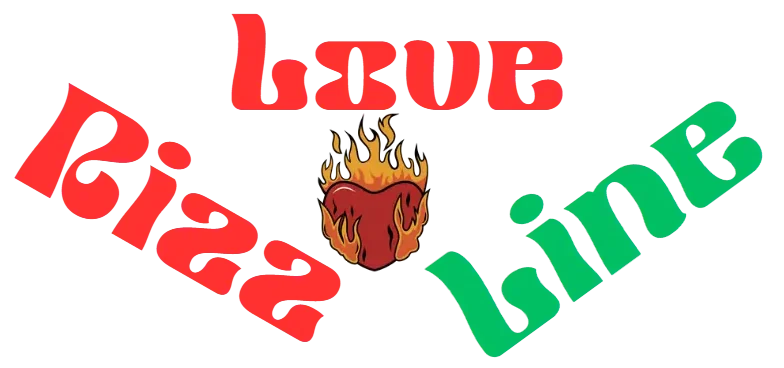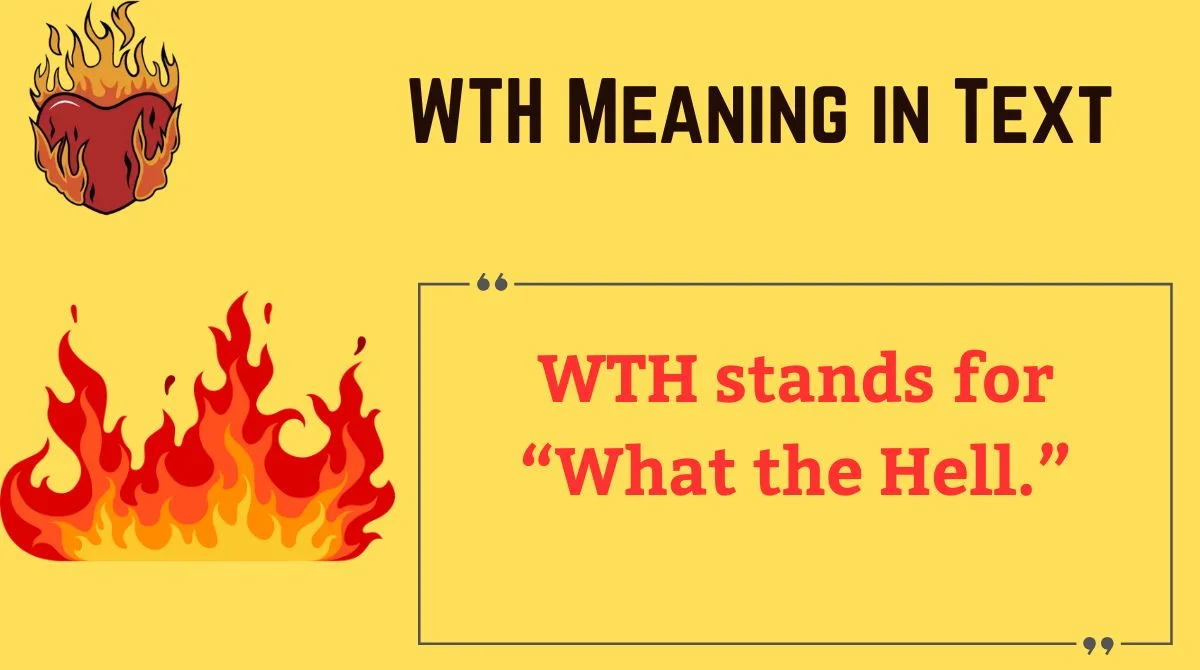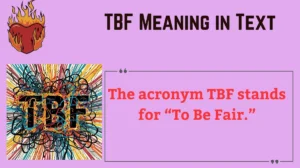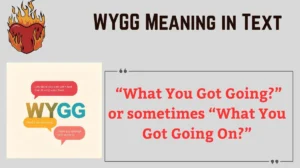Last updated on October 25th, 2025 at 04:11 pm
Understanding acronyms is essential in today’s fast-moving digital world. One abbreviation that pops up everywhere—from texts to tweets—is WTH.
If you’ve ever stared at your screen and wondered, “What does WTH mean?” you’re not alone.
This article dives deep into the WTH meaning in text, its background, usage, tone, and even how to reply when you see it.
Why “WTH” Pops Up Everywhere
Open any group chat, scroll through Twitter or glance at a friend’s Instagram comment section. Chances are you’ll see someone write “WTH?!”.
This three-letter acronym is a shorthand expression of surprise, confusion, or frustration. People use it because it’s quick, punchy, and softer than other acronyms like “WTF.”
Understanding what it really means can save you from misreading someone’s tone—or from embarrassing yourself when you use it.
WTH Meaning from a Girl 😳
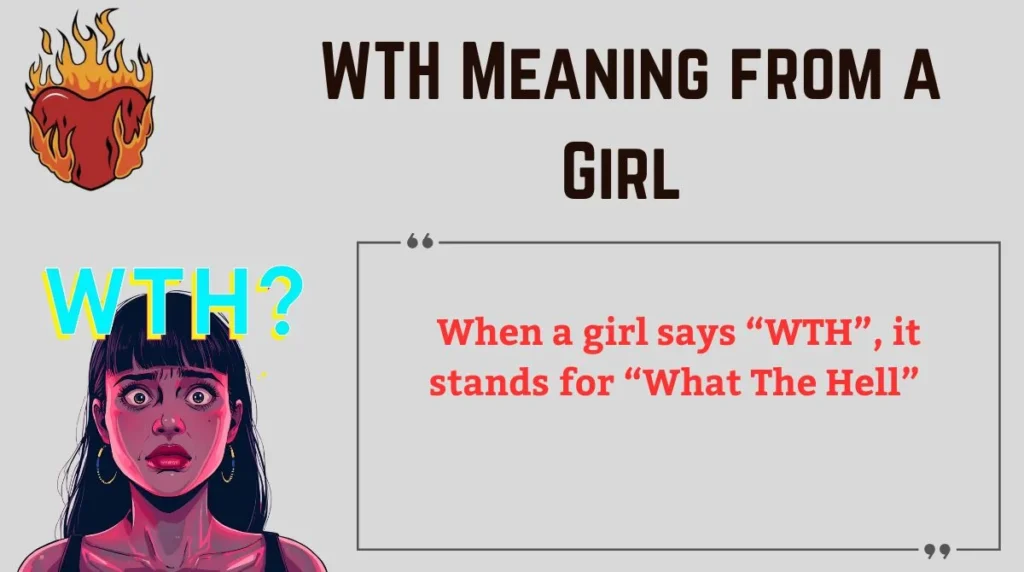
When a girl says “WTH”, it stands for “What The Hell” — a phrase used to show surprise, disbelief, or mild anger. If she texts something like “WTH was that?”, she’s likely confused or shocked by something you said or did.
The tone depends on the situation — it can be funny, sarcastic, or serious. For example, if she’s joking around, “WTH 😂” means she’s playfully surprised.
But if the message feels blunt or lacks emojis, it might signal she’s actually upset or annoyed. In short, “WTH” from a girl shows a strong reaction — emotional, funny, or irritated — depending on the chat’s context.
Definition and Core Meaning of “WTH”
WTH stands for “What the Hell.” In milder contexts, it can also mean “What the Heck.” The meaning depends on the writer’s intent and the audience they’re addressing.
- What the Hell – stronger, more emotional
- What the Heck – softer, more polite
You’ll often see it in all caps (“WTH”) to emphasize shock, but lowercase (“wth”) can feel casual or offhand. Repeated punctuation like “WTH???” usually signals heightened emotion.
Origins and Evolution
The roots of WTH stretch back to early internet forums and instant messaging in the late 1990s. Back then, users wanted a way to express disbelief without typing full sentences or swearing outright. “What the Hell” was already a common spoken phrase, so it naturally shortened into WTH.
When social networks like MySpace, then Facebook and Twitter emerged, WTH became even more mainstream. Censorship filters also played a role—some platforms blocked swear words, making “heck” a safe workaround. Over time, it became an accepted piece of digital slang rather than an edgy abbreviation.
Usage Across Different Contexts
People use WTH differently depending on the platform or situation:
- Everyday texting: “WTH happened last night?” (confusion)
- Social media posts: “WTH! My cat just learned to open doors.” (surprise)
- Workplace chat apps: “WTH is the new project scope?” (mild frustration)
- Memes and reaction posts: Often captioned over photos or GIFs for comic effect
This versatility explains why WTH meaning in text can shift from one scenario to another.
Tone and Intent: Reading Between the Lines
Tone matters as much as meaning. WTH can express:
- Surprise or disbelief: “WTH! You won the lottery?”
- Frustration: “WTH is going on with this app?”
- Playfulness: “WTH… you actually baked a cake?”
Punctuation amplifies tone:
| Form | Typical Tone |
|---|---|
| “WTH?” | Mild curiosity or confusion |
| “WTH?!” | Shock or outrage |
| “WTH…” | Suspense or disbelief |
| “wth lol” | Casual or joking |
Always consider context, punctuation, and even emojis (e.g., “WTH 😱”) to decode someone’s intent.
Common Misinterpretations & Clarifications
Sometimes people misread WTH or think it stands for something else entirely. Common misconceptions include:
- Work from Home – actually “WFH,” not “WTH”
- What the H* (assuming a stronger swear word)
- World Tourism Headquarters – a genuine acronym but unrelated to texting
Another pitfall is assuming anger where none exists. A friend typing “WTH?” might be genuinely curious, not upset.
Similar Terms and Alternatives
If WTH feels too strong—or not strong enough—there are plenty of alternatives:
| Acronym | Full Form | Tone |
|---|---|---|
| WTF | What the F*** | Explicit, very strong |
| OMG | Oh My God | Surprise, amazement |
| SMH | Shaking My Head | Disapproval |
| WTHeck | What the Heck | Polite substitute |
| WTV | Whatever | Dismissive |
These acronyms appear alongside WTH in texts and social media. Choosing the right one depends on how polite, funny, or dramatic you want to sound.
How to Respond When Someone Texts “WTH”
Your reply should match the tone and context:
- Casual conversation:
“Haha I know, right? Totally unexpected.” - Clarifying confusion:
“It’s a new update, that’s why everything looks different.” - Defusing tension:
“Sorry! I should’ve told you earlier. Here’s what happened.”
Tip: If you’re unsure whether someone’s upset, ask directly. A simple “Everything okay?” can prevent misunderstandings.
Regional and Cultural Nuances
The phrase “What the Hell” carries different weight depending on region and culture:
- United States: Considered mild by most, often used casually
- United Kingdom: Similar meaning but sometimes read as more sarcastic
- Religious or conservative settings: “Hell” may feel offensive; “Heck” is safer
- Other languages: People often adopt “WTH” directly rather than translating it, especially in multilingual online spaces
Generationally, younger users might toss “WTH” around playfully, while older users may avoid it altogether.
Use in Online Communities & Dating Apps
You’ll also spot WTH in bios, posts, or chats on apps like Tinder or Bumble. It can serve as:
- A humorous hook: “WTH am I doing here? Looking for someone to share pizza.”
- A reaction to a photo: “WTH! That view is amazing.”
- A signal of tone: informal, relaxed, not too serious
Just remember—first impressions matter. A sarcastic “WTH” in an opening line might seem funny to some but rude to others.
Hidden or Offensive Connotations
While WTH is relatively mild, it’s not completely neutral. “Hell” still carries religious significance, and in certain circles it can offend. Additionally, a few niche groups or companies use “WTH” as internal jargon (for example, “We’re Taking Holidays”), but these meanings are rare outside those circles.
If you’re writing to an audience you don’t know well, default to “What the Heck” or skip the acronym altogether.
WTH Meaning in Text from a Guy 😐
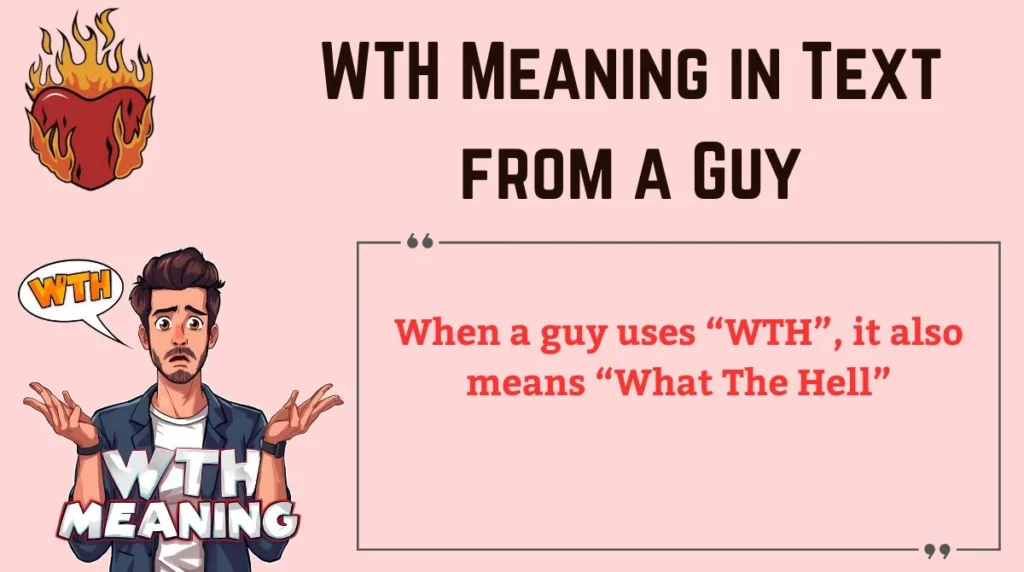
When a guy uses “WTH”, it also means “What The Hell”, often expressing shock, confusion, or frustration. Guys use it to react to something unexpected or weird.
For instance, if he says “WTH just happened?”, he’s surprised or annoyed. It can also be used jokingly in memes or casual chats, like “WTH bro 😂” to express disbelief in a funny way.
The tone matters — if he uses emojis, it’s probably lighthearted; without them, it might show genuine irritation or surprise. Overall, “WTH” from a guy reflects a strong, unfiltered reaction to something unexpected.
Suitability for Professional or Academic Communication
In professional settings, WTH generally isn’t appropriate in formal emails or reports. However, it might be acceptable in:
- Private Slack chats between colleagues who know each other well
- Informal team discussions or brainstorming threads
- Company memes or culture channels
Safer alternatives include “What on earth,” “That’s surprising,” or “I’m confused about this.”
Practical Quick Reference Table
Here’s a handy cheat sheet for WTH meaning in text:
| Context | Meaning | Tone | Safe Alternative |
|---|---|---|---|
| Friend’s text | What the Hell/Heck | Surprise or disbelief | OMG / Wow |
| Social media comment | What the Hell | Shock or excitement | 😲 / No way |
| Workplace chat | What the Heck | Mild confusion | What’s going on? |
| Dating app message | What the Hell | Humor or surprise | LOL / Haha |
Case Study: Misreading “WTH”
A marketing intern in a multinational company once sent his manager a Slack message: “WTH is this campaign?” He meant “I’m confused,” but the manager read it as “I’m angry.”
Result: an awkward meeting. Lesson learned—context and tone markers (like emojis or polite phrasing) matter, especially across cultures.
Key Takeaways
- WTH = What the Hell/Heck depending on tone and audience.
- It originated from early online communication as a mild alternative to stronger acronyms.
- Context, punctuation, and culture shape how people interpret it.
- Safer alternatives exist for professional or sensitive environments.
Frequently Asked Questions about WTH
What does WTH mean in text messages?
It typically stands for “What the Hell” or the softer “What the Heck,” expressing surprise, confusion, or disbelief.
Is WTH rude?
It’s mild compared to “WTF,” but “hell” can offend in some religious or conservative settings.
What’s the difference between WTH and WTF?
“WTF” is far stronger and explicit, while “WTH” is the polite or toned-down version.
Can I use WTH at work?
Use caution. It’s fine in casual internal chats but not in formal emails or communications with clients.
Why do people choose WTH over writing the full phrase?
It’s faster, fits character limits, and softens the impact compared to spelling out “What the Hell.”
Conclusion
In today’s digital conversation, understanding the WTH meaning in text helps you interpret messages accurately and avoid awkward misunderstandings.
This small acronym packs a big punch, signaling everything from amazement to irritation. When in doubt, match your response to the sender’s tone—or choose a safer alternative.
Mastering slang like WTH makes your online communication smoother, smarter, and far less confusing.

Mark Peter is the creative mind behind RizzleLineLove.com, your go-to hub for witty, flirty, and downright hilarious pick-up lines. With a passion for blending humor and charm, Mark crafts content that sparks conversations, breaks the ice, and adds a playful twist to everyday moments.
Whether you’re looking to impress your crush, make your friends laugh, or spice up your social media captions, his work is all about helping you connect — one clever line at a time.
